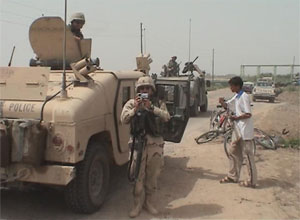In Iraq, Steve Pink ’02 takes on the role of filmmaker for The War Tapes.
by Bruce Lyndes
When Sergeant Steve Pink went to Iraq in 2004, he brought more than his weapon and helmet. Pink, a 2002 Plymouth State graduate with a bachelor’s degree in English, also took a video camera. The hundreds of hours he and his fellow N.H. National Guard soldiers recorded evolved into a ground-breaking and ultimately compelling soldier’s eye view of war entitled The War Tapes.
Directed by Deborah Scranton, The War Tapes has been nominated for an Academy Award after winning Best Documentary at the prestigious Tribeca Film Festival, as well as Best International Documentary at the Britdoc Festival. The majority of the tape used in the documentary was shot by Pink and two others, Sergeant Zack Bazzi and Specialist Mike Moriarty.
Steve Pink grew up in a blue-collar household in Kingston, Mass. His father was a cement mason, his mother, a nurse. A college education appealed to Pink, but financing it was a struggle, especially with out-of-state tuition. By the end of his sophomore year, the money ran out. But Pink found a way to go on. With a $5,000 bonus and the in-state tuition rate as incentives, he joined the N.H. Army National Guard in 2000.
“When I signed up, it cut my tuition in half,” Pink said. “I saw it as a business transaction.” The terrorist attacks of September 11 were still a year away, so Pink had no expectation of a war-time deployment. He continued his studies, trained as an infantryman on the weekends and worked as a beat reporter for Plymouth State’s student newspaper, The Clock.
But as military action commenced in Iraq and Afghanistan, Pink knew he would eventually be called into action.
“It was two years after 9/11, and many units were being mobilized,” said Pink. “When we were notified, it really wasn’t a surprise.”
In preparation for deployment, Pink’s unit went to Fort Dix, N.J., for training. Deborah Scranton was there; she stood up before the company and made an unusual request. She asked for 10 members of the unit to bring Sony miniDV video cameras into the field and record their day-to-day activities. She wanted to produce a documentary about the conflict in Iraq from a soldier’s point of view. Pink raised his hand to volunteer.
“I had a lot of questions. We all did,” Pink said. “I believed the media had [been given] a license to slant the stories in Iraq. I was, and still am, a skeptic about the media’s coverage. I simply saw it as an opportunity to have some authority in telling our story.”
A few weeks later Sergeant Steven Pink was in Iraq’s treacherous Sunni Triangle, overseeing a squad in the 172nd Infantry Regiment. He and the other soldiers were finding ways to use their cameras, such as mounting them on their Humvee antenna and carrying them on missions.
“It was the last thing I worried about,” Pink said. “Right off the bat, I promised myself this project would never interfere with my responsibility: protecting the lives of my troops.”
Pink’s squad faced dangers like improvised explosive devices and ambushes on a daily basis during their year-long tour. The cameras stayed on, recording the good, the bad, and the mundane. Each tape was reviewed by the Army’s public affairs staff before being passed along to Scranton, who eventually received all but one tape out of more than 800 hours recorded.
“We taped it all,” Pink said “The things we were doing, what it’s really like, the loyalty, the sense of duty. Regardless of your opinion of the war, we were professional soldiers doing our job.”
The taping didn’t end in the heat of Iraq.
“They followed us around for six months, [taping us] working our jobs, skiing, living together,” Pink recalled. “I was pretty nervous the first time I saw it. I didn’t know whether I would be shaking my fist at them or congratulating them. I stand behind what they did, putting it together. It’s a good job of accurately portraying our lives and our families. You get a good idea of what it’s like for soldiers and families in times of war.”
Pink introduced The War Tapes at a special screening at PSU on Nov. 1 and answered questions afterward. “This was a genuine, noble effort to show the truth, which can be elusive,” Pink told the students. “ This film shows real people dealing with their circumstances, and you see the outcomes of our policies.”









